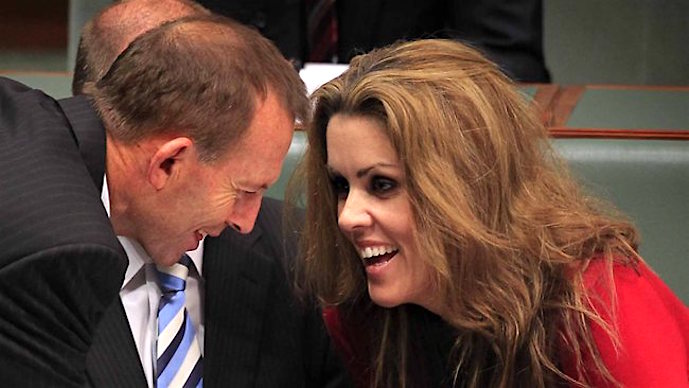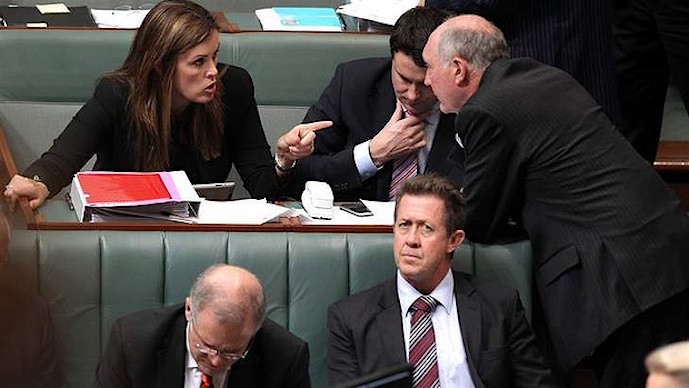-
9/03/2016
-
Ad astra
-
Peter Principle

‘What’s wrong with Tony Abbott?” It’s a question that’s been asked ever since he rose to prominence as party leader, if not before. But then the question had a whimsical ring about it. What was wrong with a leader who was so nasty, so misogynist, so belligerent, so hell bent upon the destruction of his enemies? People had their answers, answers that went back to his early days in student politics. We wrote about it on
The Political Sword in late 2009 in
The pugilistic politician. The conclusion was that this was Abbott’s nature, malevolent though it was.
Over the years we have seen a man who rose from ministerial ranks to opposition leader where he was deemed to be competent, to prime minister where he was manifestly incompetent.
Abbott’s rise is a classic example of a management principle enunciated by Laurence J. Peter in his famous 1969 book:
The Peter Principle, in which he asserted that as managers are promoted, they
"rise to the level of their incompetence." We have written about
The Peter Principle before.
Let’s trace Abbott’s path. The media was lavish in its praise for his performance as opposition leader, some going so far as to assert that he was the best ever, presumably arguing that aggression, confrontation, adversarial behaviour and ceaseless negativity were the preferred ways to electoral success. Murdoch journalists particularly barracked for him endlessly. Defeat of the detested Labor government and the installation of a grown-up, adult Coalition government was all that mattered; the means, no matter how ruthless, were irrelevant.
So it came to pass. The tacit assumption, rarely ever challenged, was that Abbott’s electoral success would translate into success in government. Some of us challenged that assumption, but who was listening?
Back as far as July 2011 we plumbed the forbidding prospect of an Abbott prime ministership on
The Political Sword in
If Tony Abbott were PM, and again in August 2013 in
Say no, no, no to Tony Abbott, we predicted the disaster that Abbott would become in government. The media though, and much of the public, were sanguine. The right-wing think tank, the Institute of Public Affairs, now had their puppet captive in the most powerful position in the land. It soon filled Abbott's policy free zone with a list of
75 policy suggestions.
Then along came his actual behaviour as prime minister.
We observed it month after awful month. Many could see a dysfunctional pattern developing as Abbott tried to apply to governance the strategies that got him elected. He seemed not to see that different strategies were needed in government; he seemed to think that persistent negativity would again win the day for him. Some columnists were prepared to point this out, but the Murdoch media continued to be his advocate, making excuses for his increasingly aberrant behaviour, hoping to see some change towards effective governance. It never came. Eventually, even News Limited journalists started to show doubts, and gave subtle warnings to Abbott. But excuse making continued, hoping that soon Abbott would wake up.
There was one journalist though who wrote regular columns in
The Australian, Niki Savva, who did begin to express reservations about Abbott and his Chief of Staff, Peta Credlin.
Now Savva has put the cat among the pigeons with her just-published book:
The Road to Ruin – How Tony Abbott and Peta Credlin Destroyed Their Own Government. Even the title is revealing:
How Tony Abbott and Peta Credlin destroyed their own Government. Savva’s story shows how Credlin believed it was as much
her government as Abbott’s. Herein lies the clue to the most extraordinary relationship that came about between Abbott and Credlin, one that achieved success in opposition but lamentable failure in government.
Although Savva’s book has been available only this week, the published excerpts and the media comments of the author and her interviewers provide enough detail for preliminary analysis.
It is not the purpose of this piece to explore whether the relationship between Abbott and Credlin was sexual in the sense they were sleeping together. Some feel affronted by this possibility; most are more concerned with the deeper relationship where Credlin seemed to have an overweening influence over Abbott, a relationship where Abbott seemed dependent on her for advice, strategies and instructions about how to run government day by day. Credlin insisted she got Abbott and the Coalition into power and that Abbott could not run the government without her. Moreover, she believed that what worked in opposition would work in government. The pattern of behaviour continued. What she failed to comprehend was that Abbott, and perhaps she too, had been promoted to their level of incompetence.
Many were worried about her tactics and her influence. Those close to Abbott were concerned, even apprehensive about her, and the way she manipulated him. Savva documents these concerns in a number of on-the-record statements ministers, backbenchers and public servants made to her. So angry and frustrated were they about Credlin’s autocratic behaviour that they were prepared to put their name to them.
What then went wrong with Tony Abbott?
Clearly, he was profoundly influenced by Credlin, dependent on her advice, and needed her instructions about what to say and how to say it. What he did not realize was that her advice was no longer relevant now that he was Prime Minister.
He wanted her to be close to him in meetings, even with international dignitaries, willing to let her run the political show, even foreign policy, happy to let her decide on his appointments, his appearances, even small details of protocol. He allowed her to micromanage his office and his cabinet, to interact with his staff, his ministers and with public servants, to instruct them, even about staff appointments, and to discipline and bully them if they disobeyed or disappointed her, sometimes in an undignified way.

Credlin’s behaviour repeatedly evoked adverse reactions and anger, among even senior people, many of whom she treated with disdain. Many of these have ventilated their longstanding resentment and frustration in Savva’s book. Many sought her removal, but Abbott would have none of that. His attachment and dependency were too great. Likewise, senior party figures warned Abbott, and at the time of the February 2014 spill advised him to get rid of Credlin. Rupert Murdoch demanded, nay ordered Abbott to sack his Chief of Staff. The advice was never heeded.
Abbott allowed Credlin to run an insular, secretive PMO that excluded many, where she overplayed her hand repeatedly, where she was dominantly in charge.
Unquestionably, she is a prepossessing woman: intelligent, accomplished, assured, and overbearing. No doubt it would have been difficult to control her, to hold her back. But it was Abbott who was selected to lead the government, not Credlin. He ought to have been in control. In
Say no, no, no to Abbott, it was postulated that in government Abbott would exhibit conflicting attributes: vengefulness and weakness. He has certainly exhibited vengefulness that all can see. But only now are we seeing the depth of his weakness. Unable to govern himself, he was so weak that he handed over governance and many of his prime ministerial functions to his Chief of Staff: he openly referred to her, and it seemed, increasingly deferred to her as the ‘Boss’. The fact that this person was a woman is immaterial; it is the fact that he recklessly handed away his responsibilities to another that is reprehensible.
What is astonishing is that the work of government could be so readily handed over to a non-elected person by someone like Abbott, who shows so much machismo, who flaunts his masculinity, who enjoys so much playing the tough guy, tough enough to ‘shirtfront’ Vladimir Putin.
Behavioural psychologists and psychiatrists would relish debating the Abbott/Credlin relationship, and attempting to attach a diagnostic label.
I will not try to emulate them, but even the untrained must be asking themselves what sort of behavioural problem, what sort of psychiatric condition each might have, and what sort of pathological relationship they might have had.
‘Emotional dependence’, where an individual can’t make decisions without the other, springs to mind. The influence of Credlin is reminiscent of that of Svengali, the evil hypnotist in the novel
Trilby by George Du Maurier. Colloquially, ‘a Svengali’ is used to describe a person who completely dominates another, usually with selfish or evil motives.
Whatever the psychiatric diagnosis might be, there is no doubt that Savva’s book documents the intensity and extent of the relationship that existed between Credlin and Abbott and its awful outcomes that proved to be so counterproductive and injurious to them both and destructive to the government they led.
This situation is more fitted to the drama of the theatre than to real life day-to-day politics, yet there it was under our very noses, at the pinnacle of our national government. How could such a situation have ever arisen? We have seen dysfunction in our federal government before, but nothing like this!
Who is to blame? While some point the finger at Credlin, clearly Abbott is the culprit. He was the prime minister, the one in charge. He should have been calling the shots. We at
The Political Sword pointed out long before Abbott became prime minister that he would be a dud should he get that job. It was only when he got it that it dawned on him that he wasn’t up to it, and so he turned to Credlin. Too inexperienced for national governance, Linus-style, Abbott reached out for his security blanket – Peta Credlin. Sadly for him, and the nation, she could not rescue him from his own incompetence. Together they resorted to opposition tactics and wrecked the government.
An even more bizarre twist to this story is that Abbott, along with some of his sycophants, still hold out hope for a second Abbott government, an exercise in delusion of monumental proportions. Well connected people in Canberra predict that if Abbott tried to topple Turnbull, he’d be lucky now to get even a tiny handful of votes; Eric Abetz, Kevin Andrews, Peter Dutton, Andrew Nikolic
et al - the so-called ‘Monkey Pod’- are likely all who are still waving Abbott’s flag.
So let’s not engage in speculation about whether their relationship was sexually intimate. It matters not. The only conclusion that is tenable is that Abbott was incompetent and insecure as prime minister. He was a dud; he did not know how to govern or how to consult; he did not know how to assume the vast and widely variable responsibilities of his position.
In a classic illustration of the Peter Principle, Abbott had risen to his level of incompetence. He turned to the only one he thought could save him, Peta. But she too was a victim of this same principle; in her case, let’s call it the ‘Peta’ Principle. She had risen to her level of incompetence. She couldn’t save him and didn’t. End of story!
What do you think?
What are your views about Niki Savva's account of the Abbott/Credlin saga, and this assessment of it?
We look forward to reading your views and your comments.
Current rating: 0.3 / 5 | Rated 15 times